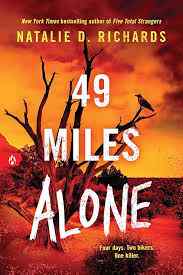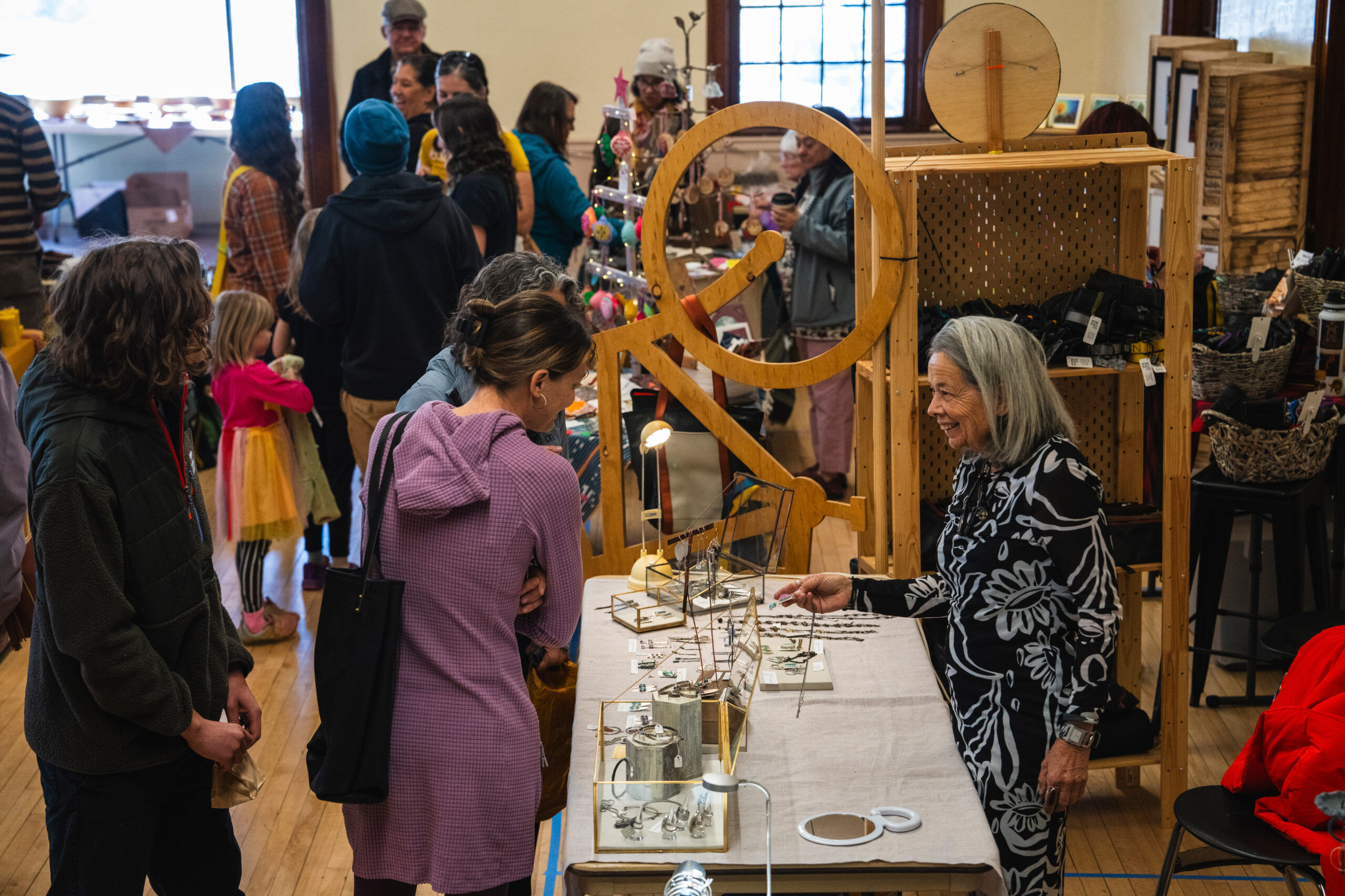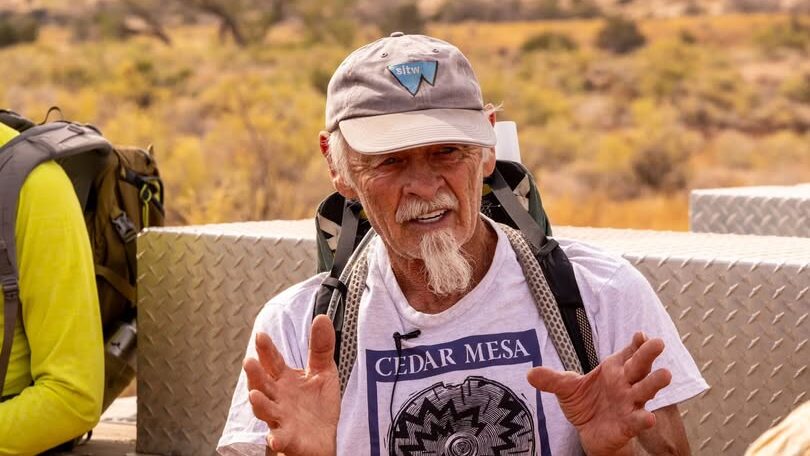Some information may be outdated.
When thriller writer Natalie D. Richards’ father died around eight years ago, she experienced grief in a way she never had before. Her life felt like it had splintered apart; her dad had instilled into her a love of reading and writing, and without him, she felt lost. On a whim, the Ohian author decided to take a trip to Southeast Utah. While driving along a desert road, she felt herself wake up from the haze that had engulfed her since his death.
“In many ways, Moab and all of the surrounding areas healed me,” she said. “It really connected with me in a way that’s a little difficult to articulate. The desert is so brutal and beautiful at the same time, that it reminds you of all of the best and worst parts of life. And somehow that really worked.”
Richards knew she wanted to write a story about surviving the unthinkable in the deserts around Moab. Years later, she finished her 11th book, the thriller “49 Miles Alone,” which will be published in July. The book follows two cousins, Katie and Aster. Desperate to heal from a traumatic event and repair their once-easy relationship, the pair tackle a four-day hiking trip in the Utah backcountry. Problems quickly arise along their journey, including illness, injury and a freak storm. But after witnessing a woman they’d met on the trail flee into the night from her boyfriend, their story of survival quickly turns into a rescue mission.
The Moab Sun News chatted more with Richards about her writing process and novel. This interview has been edited for length and clarity.
How did you become a writer?
I wanted to be a writer when I was really young. My earliest love was Dr. Seuss and then Shel Silverstein. So obviously, I veered pretty far from all of that. But I think, like many writers, what happens is you want this as a child, and then when you start to grow up, you think this is very impractical. For me, in particular, it felt like a very wealthy, privileged thing to do that was not really in my wheelhouse.
The sad part of my story is the first major death for me happened really young. My mom was 51 years old when she died pretty unexpectedly. I was 27. I realized she really had so many things that she never did. I have wanted to write my entire life, and I keep putting it away as this unrealistic dream. Then I thought, “I really have to do this, because if I don’t try, I’m going to wonder forever.” That was when I got very serious about writing. And it still took several years and several incredibly terrible books before I was ready to actually be published.
What was your writing process for this book like?
I started writing this book badly and incorrectly, probably back in 2019. And it was wrong. It wasn’t good enough. It was written from a very romantic [perspective]. I needed to go a few more times. I needed to have a few really, truly miserable hikes. Like, the one where you’re out there, and you’re like two hours into a hike and then it starts pouring down rain, and everything you’re going to eat gets soaked. And you’re soaked and you’re miserable. I needed a couple of those really miserable days so that I could have some perspective. I gotta tell you, it did not make me love it any less. I think that, honestly, it being a little more realistic and a little less fairytale-like kind of made it all the better. I think I started writing this book in earnest in 2022.
The first thing you need to learn to be a writer is that you’re going to have to kind of figure out your own way to be a writer. Some people are really detailed plotters. I am a pantser. [Meaning writing “by the seat of one’s pants”. -ed.] That’s why this was such a departure for me. This book, I really dug so deep into like the background, the history, the landscape, the maps. Like, you can’t even imagine what the table looked like when I was writing. That’s not typically like me. I usually just dive in. But it was really important that I understood these things a little deeper than I normally would.
But really being a good writer is listening to everyone. So you listen to people at the grocery store. You ask a lot of questions. And you get answers. You ask things from your Airbnb folks. You ask things from people that you see on the streets, people you see in the grocery store, gas stations, you name it. I really worked towards…talking to more people who actually lived and worked in Moab to learn the things that were frustrating. And the things that were kind of wonderful.
What challenges did you face as you were writing?
I think that I am very afraid to do this incorrectly and to create any harm on a town and a landscape that means so much to me. My fear would be disrespecting it. It really almost made me not write the book. It’s not just the beauty of the desert, which is remarkable. But it’s also the town itself and the people that helped me. I went to Back of Beyond Books probably five times the last time I was there. So that was, I think, a real challenge for me, trying to thread that needle between, I want to pay honor to this beautiful area and this wonderful town. And I also don’t want to exploit it.
One of the main characters in your book is in the desert, healing from a traumatic event that happened to her. Did the novel draw from your own experiences?
There is a saying that in order to write a book really well, even fiction—maybe particularly fiction—you have to go to the “hot stove”: to the darkest, scariest place. I don’t want to really return to that pain, but I will. You have to touch the hot stove to make fiction honest. You have to touch the scariest things in yourself. So yes, I certainly knew that a part of the reason that Utah was very important to me was because I did a lot of healing there. I did definitely reconnect with myself in that place. But it also isn’t a mystical unicorn place, and I didn’t want to do that. So the book is definitely not about the mystical desert that fixes everything, because it doesn’t. It really gives you the space and the quiet and the perspective to look at yourself more honestly.
It definitely pulled on some of my pain from losing my father. But also, she [the character in the book] is a sexual assault survivor. And that pulled from some things as well in my past. So it is more honest maybe than I wanted to be. I was a little afraid to write it, in many ways. Sometimes it’s really scary to touch those really frightening, painful things in your past. But it also is resonating. I’ve had many readers reaching out, talking to me about their own experiences.
What do you want readers to take away from this book?
I think probably the most important thing to take away from it is that survival is really up to us. And it’s also really personal. What does it mean to survive? What does it mean to thrive in the face of adversity? And what does it mean to heal? What does it mean to get past something? Because I think the really difficult things in our lives are not things we get past. They are things we learn to live with. And what does that mean? What does that look like? I think it’s different for everyone. That’s what I want people to take away from it. First of all, you can survive it. And the “how” doesn’t have to look a certain way. The “how” can look the way you need it to look. That’s probably the thing I want people to see the most.
“49 Miles Alone” comes out on July 2. You can catch Richards at Back of Beyond Books on Nov. 6, 2024, and she will lead a writing workshop at Grand County Public Library on Nov. 7,
2024.
Appreciate the coverage? Help keep local news alive.
Chip in to support the Moab Sun News.





